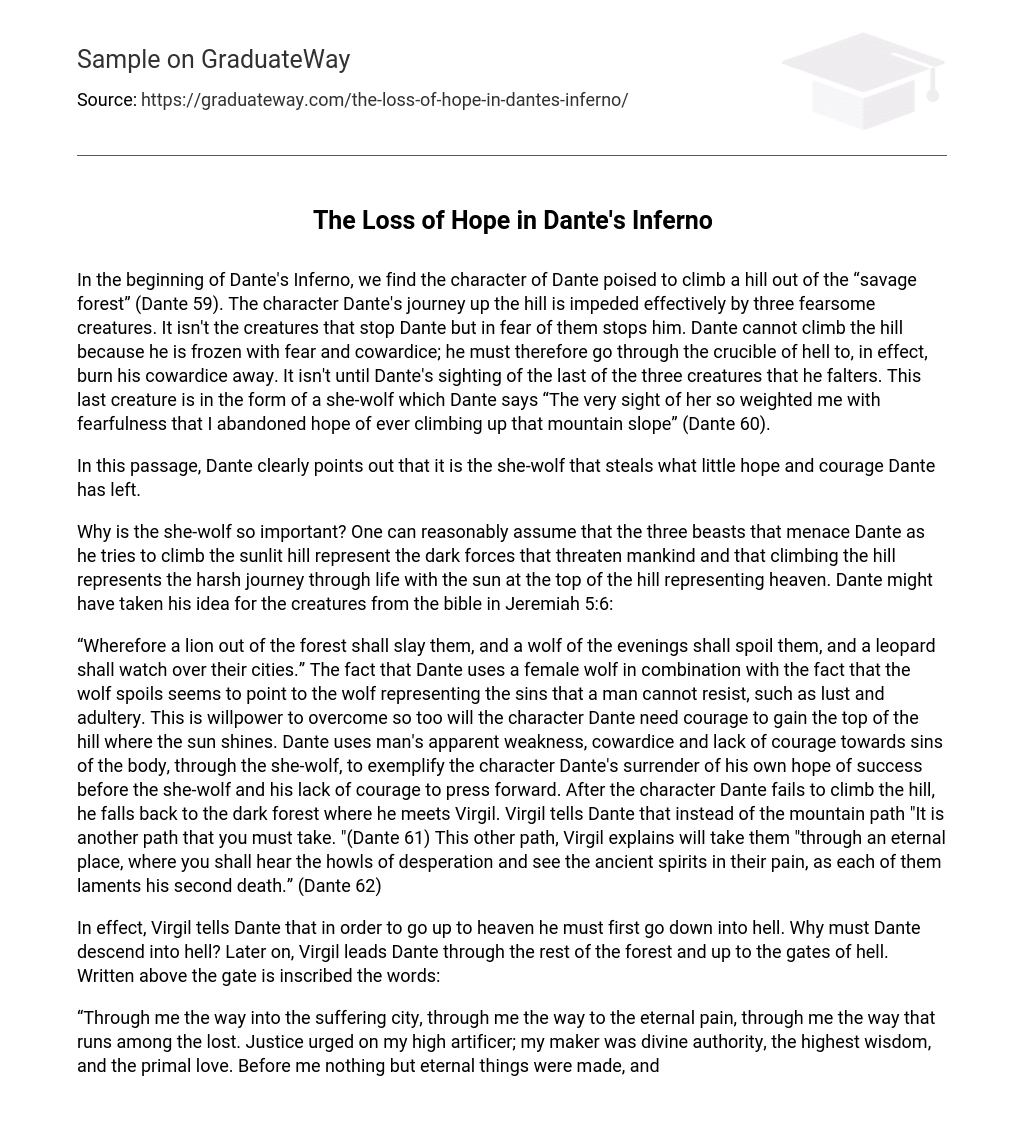In the beginning of Dante’s Inferno, we find the character of Dante poised to climb a hill out of the “savage forest” (Dante 59). The character Dante’s journey up the hill is impeded effectively by three fearsome creatures. It isn’t the creatures that stop Dante but in fear of them stops him. Dante cannot climb the hill because he is frozen with fear and cowardice; he must therefore go through the crucible of hell to, in effect, burn his cowardice away. It isn’t until Dante’s sighting of the last of the three creatures that he falters. This last creature is in the form of a she-wolf which Dante says “The very sight of her so weighted me with fearfulness that I abandoned hope of ever climbing up that mountain slope” (Dante 60).
In this passage, Dante clearly points out that it is the she-wolf that steals what little hope and courage Dante has left.
Why is the she-wolf so important? One can reasonably assume that the three beasts that menace Dante as he tries to climb the sunlit hill represent the dark forces that threaten mankind and that climbing the hill represents the harsh journey through life with the sun at the top of the hill representing heaven. Dante might have taken his idea for the creatures from the bible in Jeremiah 5:6:
“Wherefore a lion out of the forest shall slay them, and a wolf of the evenings shall spoil them, and a leopard shall watch over their cities.” The fact that Dante uses a female wolf in combination with the fact that the wolf spoils seems to point to the wolf representing the sins that a man cannot resist, such as lust and adultery. This is willpower to overcome so too will the character Dante need courage to gain the top of the hill where the sun shines. Dante uses man’s apparent weakness, cowardice and lack of courage towards sins of the body, through the she-wolf, to exemplify the character Dante’s surrender of his own hope of success before the she-wolf and his lack of courage to press forward. After the character Dante fails to climb the hill, he falls back to the dark forest where he meets Virgil. Virgil tells Dante that instead of the mountain path “It is another path that you must take. “(Dante 61) This other path, Virgil explains will take them “through an eternal place, where you shall hear the howls of desperation and see the ancient spirits in their pain, as each of them laments his second death.” (Dante 62)
In effect, Virgil tells Dante that in order to go up to heaven he must first go down into hell. Why must Dante descend into hell? Later on, Virgil leads Dante through the rest of the forest and up to the gates of hell. Written above the gate is inscribed the words:
“Through me the way into the suffering city, through me the way to the eternal pain, through me the way that runs among the lost. Justice urged on my high artificer; my maker was divine authority, the highest wisdom, and the primal love. Before me nothing but eternal things were made, and I endure eternally. Abandon every hope who enter here.” (Dante 68) The inscription seems to indicate that beyond the gates of hell there is no hope and thus no courage. Dante asks Virgil to explain the meaning of the words. Virgil rightfully replies: “Here one must leave behind all hesitation; here every cowardice must meet its death.” (Dante 68) With this very simple explanation, Virgil answers the question of why Dante must travel through hell. By journeying through hell, Dante will consequently lose his coward streak. The fires and horrors of hell will harden him so that he will come out the other side with hope, courage and will power. It is not a mere coincidence that these are precisely the same traits Dante must lose and gain in order to climb the sun lit mountain but a well-arranged plan.





